home > articles > apologetics > Responding To Celebrity Deconstructionism
RESPONDING TO CELEBRITY DECONSTRUCTIONISM
My hope in penning this response to ‘celebrity (Christian) deconstructionism’ is that it will give any believer whose faith may have been rocked by these celebrity deconstructionists some reasons to have confidence in historic Christianity as described in the ecumenical creeds, Scripture, and much of Church tradition (1John 2:28). Christian ‘deconstructionism’ has a range of meanings. I will refer to the range of these shortly. I am responding to deconstructionism by using the term in the way that celebrity deconverters have offered their own definition of the term. The reason this response is called for is largely due to the prescriptive mission that many deconstructionists seem to be on by urging Christian young people to also deconstruct their faith in Christ and His Word.
CELEBRITIES WHO HAVE DECONSTRUCTED
 Several high-profile Christian performing artists and celebrities have famously deconstructed their Christianity and have frequently also described it as “deconverting”. This includes DC Talk’s Kevin Max, and Hawk Nelson’s John Steingard and former pastor and best-selling author, Joshua Harris. Kevin Max describes his deconversion as progressing and himself now as an exvangelical.
Several high-profile Christian performing artists and celebrities have famously deconstructed their Christianity and have frequently also described it as “deconverting”. This includes DC Talk’s Kevin Max, and Hawk Nelson’s John Steingard and former pastor and best-selling author, Joshua Harris. Kevin Max describes his deconversion as progressing and himself now as an exvangelical.
These stories have frequently rocked the faith of younger believers—especially since many of these deconstructed celebrities actually encourage these younger believers to deconvert. If you’re being influenced by a deconverted Christian celebrity to consider deconverting yourself, then please consider this response.
DEFINING DECONSTRUCTIONISM

When someone who is a ‘Christian celebrity’ deconstructs their Christianity they may mean-
(i) Stripping back their understanding of Christianity to ‘basics’
by filtering out those peripheral aspects of ‘cultural’ Christianity from what Jesus taught. This perhaps might be better understood as simplifying rather than deconstucting.
(ii) Seeking to dispense with what they consider to be legalism
from their understanding of how to live as Christian. In this sense there is a tendency to view any restrictions on morality — particularly sexual morality — as outdated and not in keeping with modern acceptable standards of sexuality.
(iii) Rejecting the authority of Scripture and/or Church tradition
in defining Christian belief and practice. One deconverter was noted to have said that he was now rejecting the bible and the teaching of the Church (which he stated had both been corrupted over time), and instead, he was now simply going to treat others the way he wanted to be treated, instead of living as a Christian.
It is with this particular range of meanings that I am responding to deconstructionism. The reason this is important is because other people may use this term to describe de-converting or merely re-assessing what they have been taught and then feel that my definition of the term does not accurately reflect their use of the term. I am attempting to however to use its most common usages in this response.
WHY DECONSTRUCTIONISM ISN’T NECESSARILY A BAD THING
 According to the lead singer of Skillet, John Cooper, in a Youtube interview with Alisa Childers (former lead singer of ‘Zoe Girls’), stated that there are many in the contemporary Christian music (CCM) industry who are not genuine Christians. This is evidenced by their lifestyle choices and, according to Cooper, most notably their lack of commitment to a local church. If this is the case, it is therefore not surprising that some of these Christian celebrities who have then ‘deconverted’ but may not have ever been sincerely Christian according to Cooper.
According to the lead singer of Skillet, John Cooper, in a Youtube interview with Alisa Childers (former lead singer of ‘Zoe Girls’), stated that there are many in the contemporary Christian music (CCM) industry who are not genuine Christians. This is evidenced by their lifestyle choices and, according to Cooper, most notably their lack of commitment to a local church. If this is the case, it is therefore not surprising that some of these Christian celebrities who have then ‘deconverted’ but may not have ever been sincerely Christian according to Cooper.
When someone has critically examined their understanding of Christianity and comes to see that they have been taught some non-biblical doctrines they may go through a type of deconstruction as they seek to discover what biblical (or genuine) Christianity doctrines actually are. For example, when some Christians discover that they have been taught that salvation is faith in Christ and keeping certain imposed church rules, they may describe this deconverting. Some identifying as Christians may discover that their church is actually a cult which is generally characterised by:
° salvation by works (legalism)
° authoritarian leadership who cannot by challenged
° an additional ‘holy book’ usually written by the original cult leader who often claims divine inspiration of the book
° a belief that their church is the only ones who have the truth
° a peculiar view on ‘end-times’ bible prophesies.
Someone recognising that they are in a cult will often completely deconstruct by abandoning all confidence in Christianity and the bible because their ability to distinguish between true and nearly true has been damaged by their experience of the cult’s indoctrination. But some former cult members have been able to deconstruct the lies of their cult’s teaching from the truth of God’s Word and come to discover and accept historic Christianity – albeit, often at the cost of their family’s rejection.
MISGUIDED TEACHING ABOUT DATING CREATION
Many of those who have deconstructed have discovered that what they thought was core Christian teaching did not correspond to what the bible actually teaches. This is especially true when it comes to the doctrines of creation and eschatology. In the book Dominion: Making the Western Mind, author Tom Holland, describes how he abandoned Christianity at a young age because he was taught in Sunday School that Noah took dinosaurs onto the ark. This assumption about dinosaurs being on the ark in the story of Noah’s flood is based on an assumption that the time of Noah’s flood could be calculated by using the bible’s genealogies. The same assumption about the use of biblical genealogies is used by some bible teachers to calculate when the universe itself was created. However, upon closer examination of the biblical texts it becomes apparent that the biblical genealogies are exhaustive which makes using them impossible for calculating such dates. Put simply, the Bible simply does not state when the universe was created which means that there is nothing in the bible that is contradicted by science. This is something that I hope one day Tom Holland will discover to his eternal benefit.
MISGUIDED TEACHING ABOUT THE END OF THE WORLD
Eschatology is the doctrine of last things. Many Christians have been taught that the Bible teaches that Jesus will return within their lifetime. This claim is supported by interpretations of bible prophecies that assert current world events are the fulfilment of these precursor prophecies to the return of Christ. But put simply, the bible does not give a date for either the return of Christ or the end of the world. It is quite possible, and biblically so, that the return of Christ may still be thousands of years off yet! When someone who has been indoctrinated into believing that the bible teaches that the universe is only 6,000 years old or that the end of the world will happen within their lifetime discovers that Bible does not teach these things, they often completely deconstruct. If, by God’s grace, they encounter a biblically-literate Christian who is able to help them to partially deconstruct their understanding of Christianity by dismantling the wrong teaching about creation and eschatology, they may have a positive deconstruction experience.
This is why I say that deconstructionism is not always a bad thing.
 Added to this, if singer and musician, John Cooper, is correct in saying that many celebrities in the contemporary Christian music industry are not genuine Christians, then their deconstruction (and deconversion) might be seen as a good thing. Since one of the objections raised by opponents to Christianity is that “Christianity cannot be true because there are so many Christian hypocrites!”, then the announcement of these alleged non-genuine Christians as having deconverted may diminish this accusation. However, there are growing reports of some celebrities who have announced their deconstruction who have had a biblically-literate Christian befriend them and walk with them through a biblically consistent way to look at their intellectual and emotional causes of doubt which has led to their reconversion.
Added to this, if singer and musician, John Cooper, is correct in saying that many celebrities in the contemporary Christian music industry are not genuine Christians, then their deconstruction (and deconversion) might be seen as a good thing. Since one of the objections raised by opponents to Christianity is that “Christianity cannot be true because there are so many Christian hypocrites!”, then the announcement of these alleged non-genuine Christians as having deconverted may diminish this accusation. However, there are growing reports of some celebrities who have announced their deconstruction who have had a biblically-literate Christian befriend them and walk with them through a biblically consistent way to look at their intellectual and emotional causes of doubt which has led to their reconversion.

CELEBRITY DOES NOT MEAN EXPERT
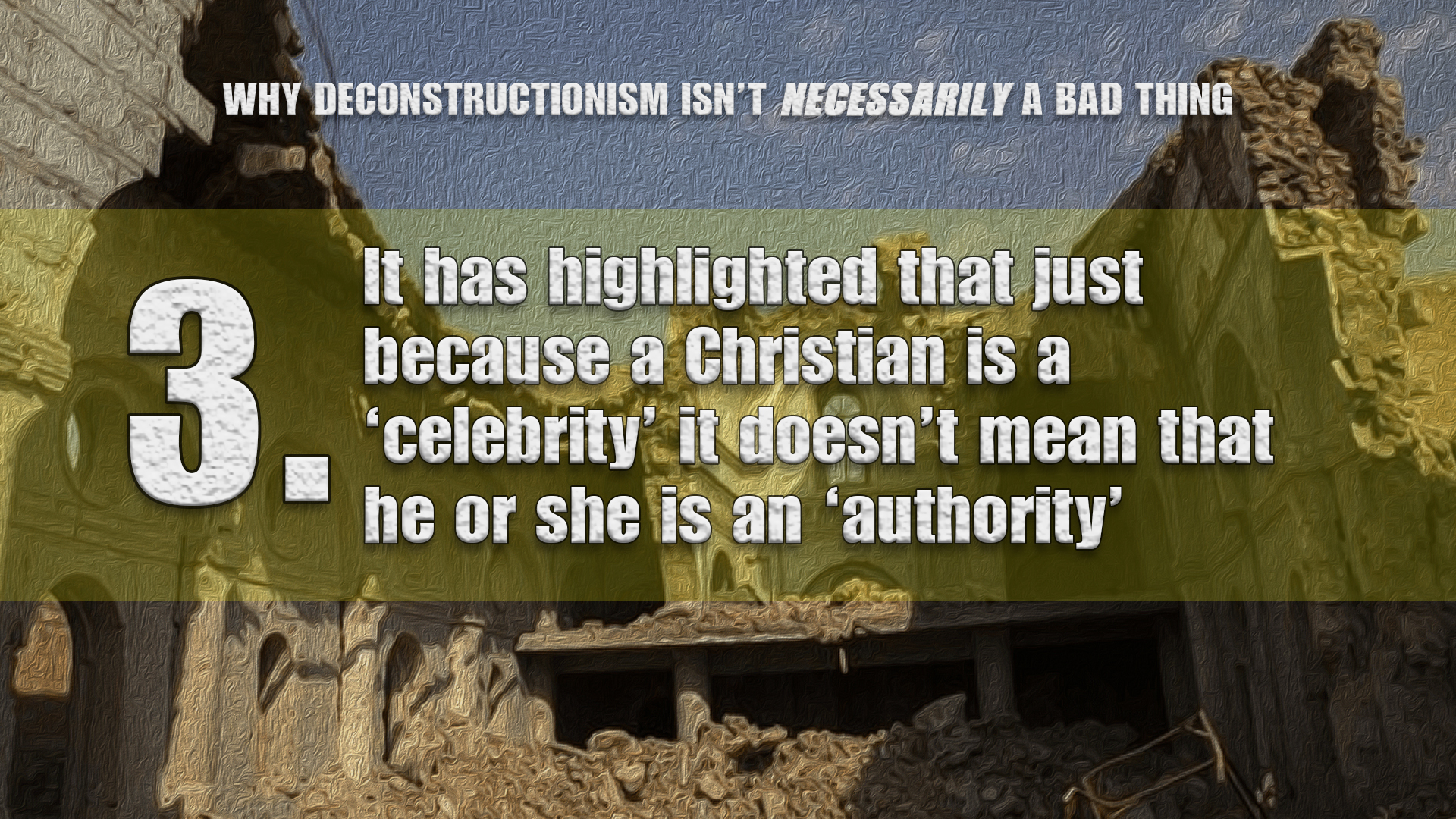 We live in era when celebrities are treated as experts. What qualifies someone as an expert? It is reasonable that if someone has a university degree in a specialty field, that they may know more about that topic than most. But even in such instances, when someone presents him or herself as an expert and makes a claim, the appropriate response is how do you know? That is, it is not who is making the claim that substantiates the claim; rather, it is the reasons given that either substantiate or repudiate the claim. This is why we should distinguish the difference between an assertion and an argument. An assertion is merely stating an opinion. An argument is making a case by giving verifiable reasons. All too often a celebrity asserts their opinion as if it is a fact. This is especially the case when it comes to claims about bible and its apparent contradictions or errors.
We live in era when celebrities are treated as experts. What qualifies someone as an expert? It is reasonable that if someone has a university degree in a specialty field, that they may know more about that topic than most. But even in such instances, when someone presents him or herself as an expert and makes a claim, the appropriate response is how do you know? That is, it is not who is making the claim that substantiates the claim; rather, it is the reasons given that either substantiate or repudiate the claim. This is why we should distinguish the difference between an assertion and an argument. An assertion is merely stating an opinion. An argument is making a case by giving verifiable reasons. All too often a celebrity asserts their opinion as if it is a fact. This is especially the case when it comes to claims about bible and its apparent contradictions or errors.
WHY DOES ANYONE DECONVERT?
 Dr. John Marriott undertook his doctoral research into the question, “Why does any Christian leave their faith?” and in 2021 published his findings in the book The Anatomy of Deconversion. Marriott conducted extensive interviews with former Christians who had deconstructed their Christianity and then deconverted. He was able to categorise their reasons for deconverting into three broad classifications: (i) The problem of evil; (ii) The problem of science and the bible; (iii) The epistemological problems (many of the bible’s claims are perceived to be mythological and therefore against rational reasoning).
Dr. John Marriott undertook his doctoral research into the question, “Why does any Christian leave their faith?” and in 2021 published his findings in the book The Anatomy of Deconversion. Marriott conducted extensive interviews with former Christians who had deconstructed their Christianity and then deconverted. He was able to categorise their reasons for deconverting into three broad classifications: (i) The problem of evil; (ii) The problem of science and the bible; (iii) The epistemological problems (many of the bible’s claims are perceived to be mythological and therefore against rational reasoning).
CATEGORY #1: THE PROBLEM OF EVIL
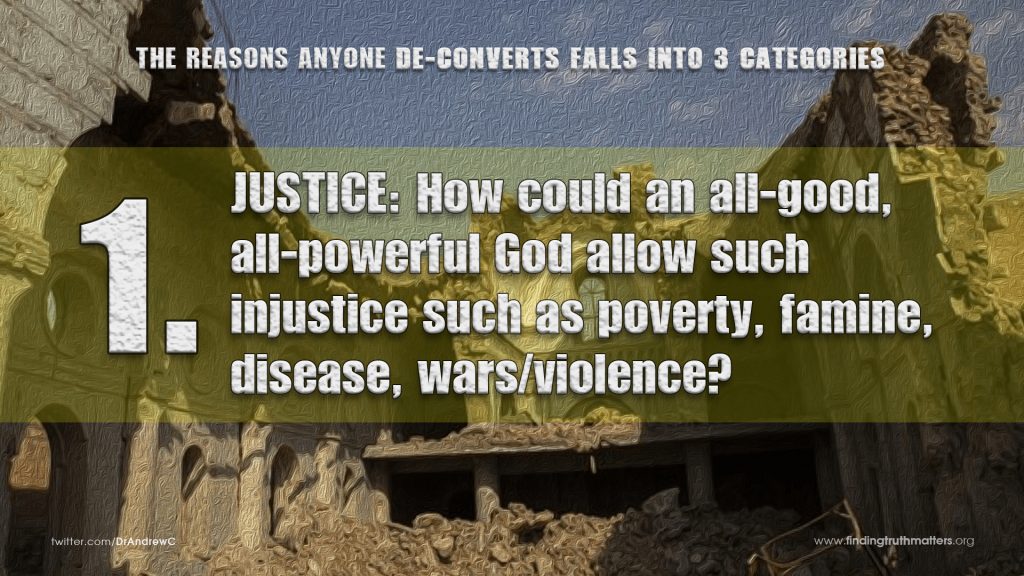 The faith of some Christians has been challenged by the problem presented by many atheists: How could a good, all-powerful God allow evil in the world He has created? In response to this objection to the God of the Bible, that is, the God of Christianity, two related questions need to be answered to understand why this is not a problem for Christians to maintain their faith in God. Firstly, was evil a part of the world that God created or has it been introduced by taking advantage of the intrinsic moral freedom that the Creator embedded into His creation? Secondly, has the all-powerful and eternal standard of good – God – done anything about the evil that is now in the world?
The faith of some Christians has been challenged by the problem presented by many atheists: How could a good, all-powerful God allow evil in the world He has created? In response to this objection to the God of the Bible, that is, the God of Christianity, two related questions need to be answered to understand why this is not a problem for Christians to maintain their faith in God. Firstly, was evil a part of the world that God created or has it been introduced by taking advantage of the intrinsic moral freedom that the Creator embedded into His creation? Secondly, has the all-powerful and eternal standard of good – God – done anything about the evil that is now in the world?
The answer to the first question is clearly no. God did not create the world with evil in it. Evil came into the world due to the gift of freedom that the Creator bestowed upon all of His moral creatures – both heavenly and earthly. The answer to the second question goes to the heart of the Christian message. God sent His Son into this world permeated by evil and He experienced it (culminating in His passion and crucifixion). The apostle Paul highlighted this divine response to evil in our world by writing:
[Jesus], though He was in the form of God, did not count equality with God a thing to be grasped, but emptied Himself, by taking the form of a servant, being born in the likeness of men. And being found in human form, He humbled Himself by becoming obedient to the point of death, even death on a cross.
Philippians 2:6-8
The apostle John stated that it was by virtue of Christ’s death at the hands of evil forces and His resurrection from the dead that led to Him defeated evil and ensuring that its alien invasion of the world was now doomed.
Whoever makes a practice of sinning is of the devil, for the devil has been sinning from the beginning. The reason the Son of God appeared was to destroy the works of the devil.
First John 3:8
Therefore, it is only the Christian gospel that adequately responds to the problem of evil in the world while actually reinforcing that God is all-good and all-powerful. By the way, by abandoning the Christian gospel because of the problem of evil in our world, does not result in the problem being resolved from the atheist perspective of the world. Thus, if tempted to reject Christianity because of the problem of evil (which I have just shown is not actually a problem for Christians because of the Cross), be sure before you yield to that temptation that you have an adequate explanation or solution ready to replace it!
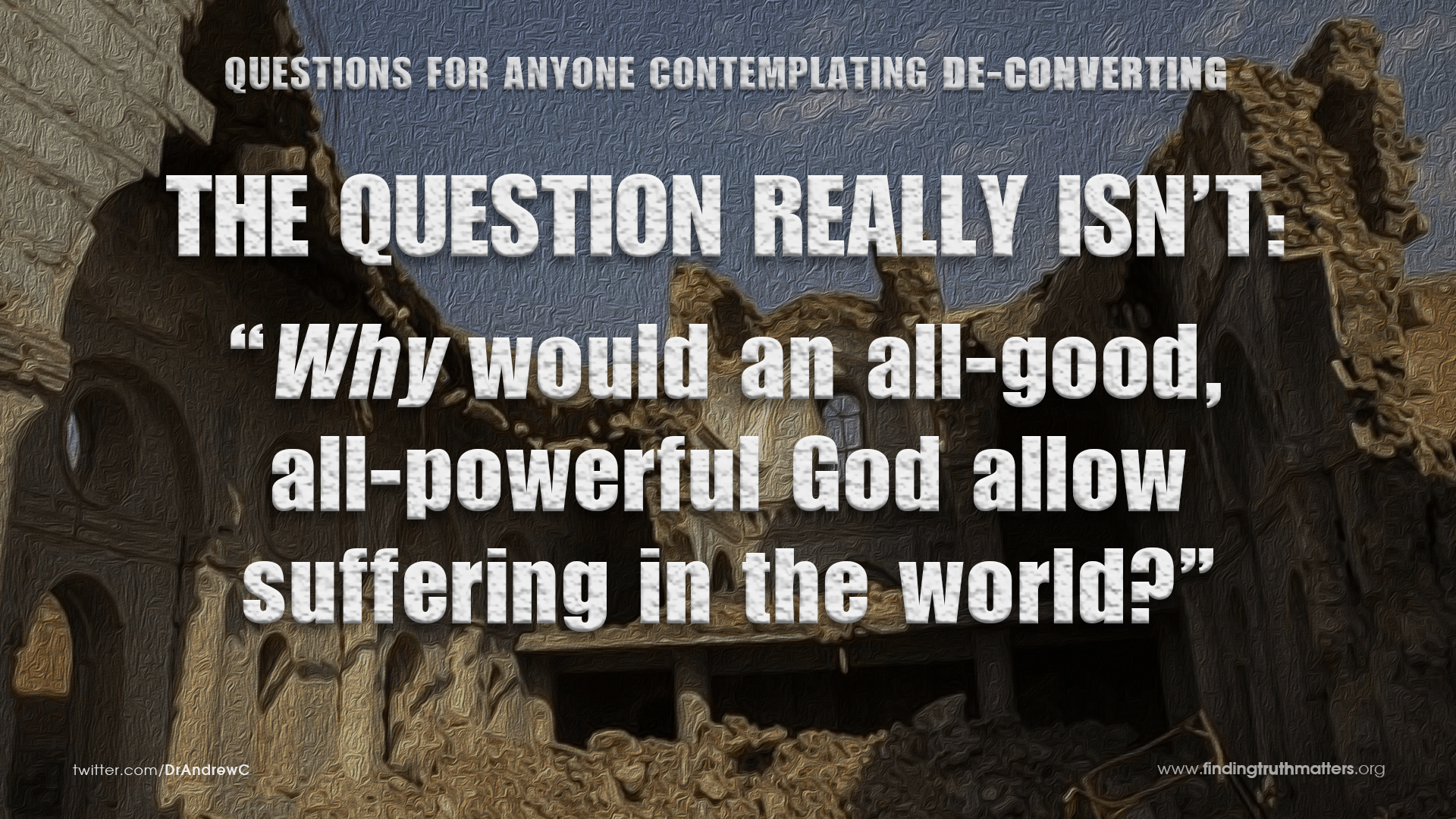
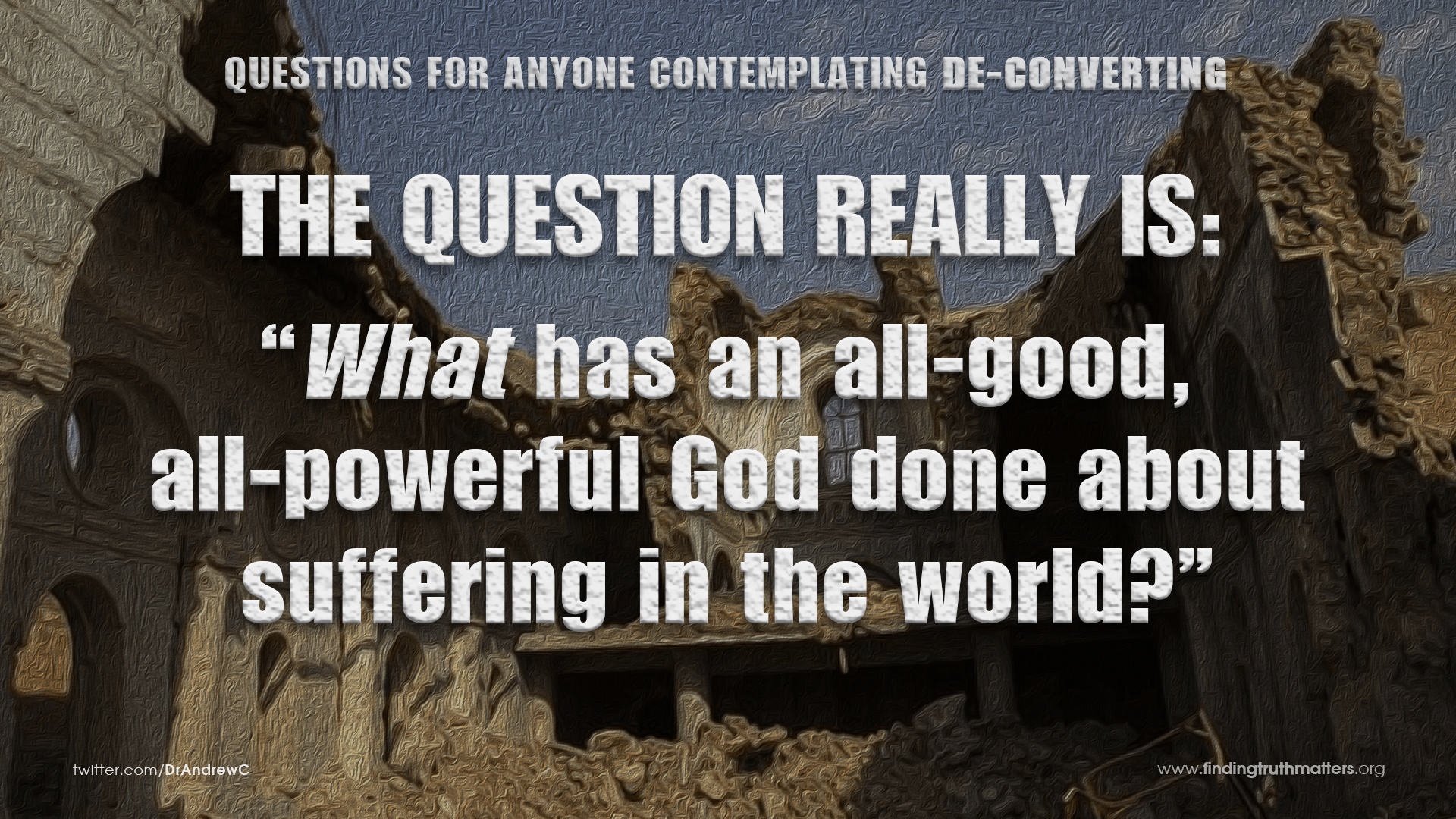
CATEGORY #2: THE PROBLEM OF SCIENCE CONTRADICTING THE BIBLE
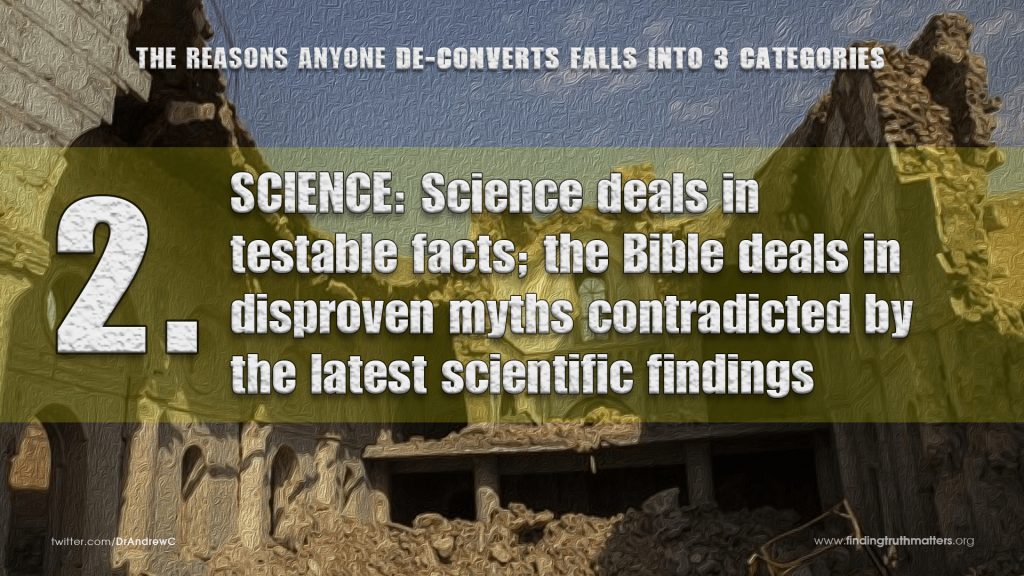 It’s worth noting that the founders of modern science, Galileo, Kepler, Newton, Pascal, Pasteur, were all believers in God. They actually believed that science was only possible because the world was made by a God who ordered the universe and invested into natural laws to maintain that order. I have dealt with the pseudo-scientific assertions made by some bible teachers who have taken some of the bible in a rather wooden-literal manner resulting in assertions about what the bible teaches that are clearly scientifically wrong (such as the age of the universe, earth, and the time of the origin of mankind.
It’s worth noting that the founders of modern science, Galileo, Kepler, Newton, Pascal, Pasteur, were all believers in God. They actually believed that science was only possible because the world was made by a God who ordered the universe and invested into natural laws to maintain that order. I have dealt with the pseudo-scientific assertions made by some bible teachers who have taken some of the bible in a rather wooden-literal manner resulting in assertions about what the bible teaches that are clearly scientifically wrong (such as the age of the universe, earth, and the time of the origin of mankind.
It was David Hume who asserted that miracles were “violations of the laws of nature”. But Hume’s definition of a miracle was incorrect. Firstly, what we call “the laws of nature” are our descriptions of what normally happens when left without interference. Secondly, miracles are God’s intervention into the ordinary outworking of the “laws” of nature. Therefore, there is no contradiction between credible physical science and what the Bible teaches.
CATEGORY #3: THE PROBLEM OF RATIONAL REASONING AND THE BIBLE
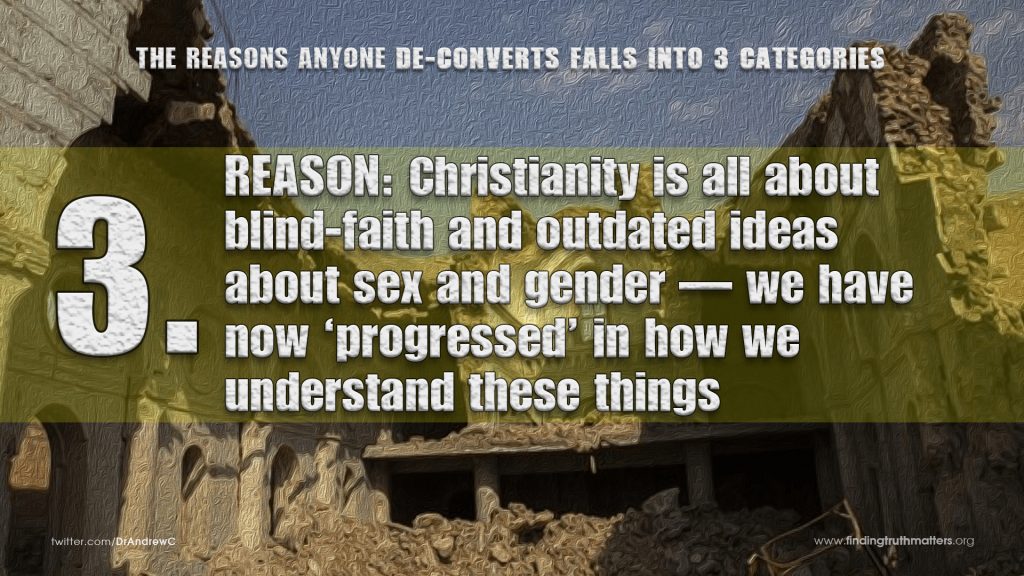 It is claimed that the bible has merely enshrined an outdated mode of viewing human sexuality that sees homosexuality as wrong and monogamous marriage as the only lawful environment for sexual activity. It is true that the bible outlaws six forms of sexual behaviour that it regards as violations of the Creator’s intention for sexual activity. These include: (i) incest (Lev. 18:6-16; Luke 3:19); (ii) polygamy (Lev. 18:18; 1Tim. 3:2); (iii) fornication (Lev. 18:19; Matt 15:19); (iv) adultery (Lev. 18:20; Matt. 5:28; Rom. 2:22); (v) homosexuality (Lev. 18:22; 20:23; Rom. 1:27; 1Cor. 6:9); and, (vi) bestiality (Lev. 18:23). It is also true that the Jews classed all these prohibitions as grievous sins under the category of sexual immorality. Jesus Christ affirmed this in Matthew 15:19-20. The apostles re-affirmed it in their epistles – including Christ’s brother, Jude (Jude 4, 7-8). It is also true that the bible describes that each of these acts of sexual immorality date back to the earliest times as recorded in the opening book of the bible (Genesis). Rather than the bible enshrining contemporary attitudes about sex and sexuality, it has always been counter-cultural by affirming that God has designed sexual activity for a tri-fold purpose including the procreation of children and that the Creator has decreed that sex is not to be without a covenant commitment of marriage, and that marriage is designed to be one man married to one woman for one lifetime. Here is how Jesus Christ stated it:
It is claimed that the bible has merely enshrined an outdated mode of viewing human sexuality that sees homosexuality as wrong and monogamous marriage as the only lawful environment for sexual activity. It is true that the bible outlaws six forms of sexual behaviour that it regards as violations of the Creator’s intention for sexual activity. These include: (i) incest (Lev. 18:6-16; Luke 3:19); (ii) polygamy (Lev. 18:18; 1Tim. 3:2); (iii) fornication (Lev. 18:19; Matt 15:19); (iv) adultery (Lev. 18:20; Matt. 5:28; Rom. 2:22); (v) homosexuality (Lev. 18:22; 20:23; Rom. 1:27; 1Cor. 6:9); and, (vi) bestiality (Lev. 18:23). It is also true that the Jews classed all these prohibitions as grievous sins under the category of sexual immorality. Jesus Christ affirmed this in Matthew 15:19-20. The apostles re-affirmed it in their epistles – including Christ’s brother, Jude (Jude 4, 7-8). It is also true that the bible describes that each of these acts of sexual immorality date back to the earliest times as recorded in the opening book of the bible (Genesis). Rather than the bible enshrining contemporary attitudes about sex and sexuality, it has always been counter-cultural by affirming that God has designed sexual activity for a tri-fold purpose including the procreation of children and that the Creator has decreed that sex is not to be without a covenant commitment of marriage, and that marriage is designed to be one man married to one woman for one lifetime. Here is how Jesus Christ stated it:
¶ And Pharisees came up to Him and tested Him by asking, “Is it lawful to divorce one’s wife for any cause?” He answered, “Have you not read that He who created them from the beginning made them male and female, and said, ‘Therefore a man shall leave his father and his mother and hold fast to his wife, and the two shall become one flesh’? So they are no longer two but one flesh. What therefore God has joined together, let not man separate.”
Matthew 19:3-6
WHO IS SUSCEPTIBLE TO PRESCRIPTIVE DE-CONVERSION PRESSURE?
QUESTIONS FOR ANYONE CONTEMPLATING DE-CONVERTING
John Cooper has stated that many highly platformed Christians, particularly in the contemporary Christian music industry have grown up uncritically accepting the things they were taught about Christianity, who then have had each of these beliefs challenged. Cooper also asks, “Have you noticed that all of the objections to Christianity [by de-constructers] are the same trends in culture?” Dr. John Marriott counsels that we should be sympathetic toward those Christians who are attempting to deconstruct their faith because they are often motivated by a concern for issues of justice and equality. But just as it might be true that many of the Christian celebrities who have deconstructed their faith had never critically examined what they had been about the bible and Christianity, it is also highly likely that many young people who are Christian considering following in the footsteps of their celebrity idols have also never critically examined their faith in Christianity and the bible either. This is often compounded by hurts, offences, or disappointments that these young people have felt toward Christians who are either hypocritical or indifferent to matters of truth and justice. It is my hope that God will grace such young believers with a caring shepherd who can walk with them through their life and faith struggles and that what I have briefly penned will give them reasons to seek this out if only by prayer.
© Dr. Andrew Corbett, 13th March 2022
6 Comments
Submit a Comment
-
Sale!

5 Things We Need To Do To Break Our Church’s 200 Barrier, Premium Audio
Original price was: $1.75.$0.95Current price is: $0.95. -
Sale!

A Morning With Izaak Walton – The Compleat Man, Premium Audio
Original price was: $1.75.$1.25Current price is: $1.25. -
Sale!
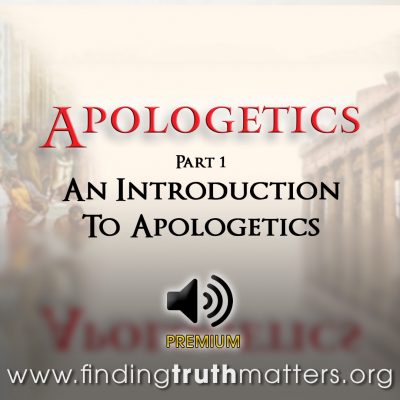
Apologetics Part 1 – Introduction To Apologetics, Premium Audio
Original price was: $1.75.$0.95Current price is: $0.95. -
Sale!
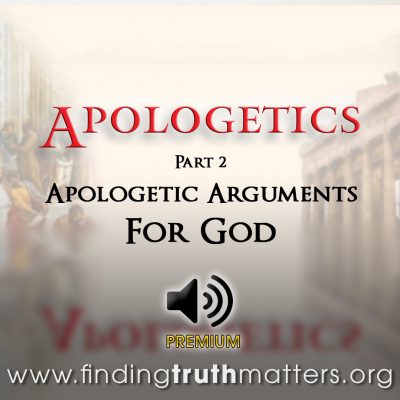
Apologetics Part 2 – The Apologetic Arguments For God, Premium Audio
Original price was: $1.75.$0.95Current price is: $0.95.



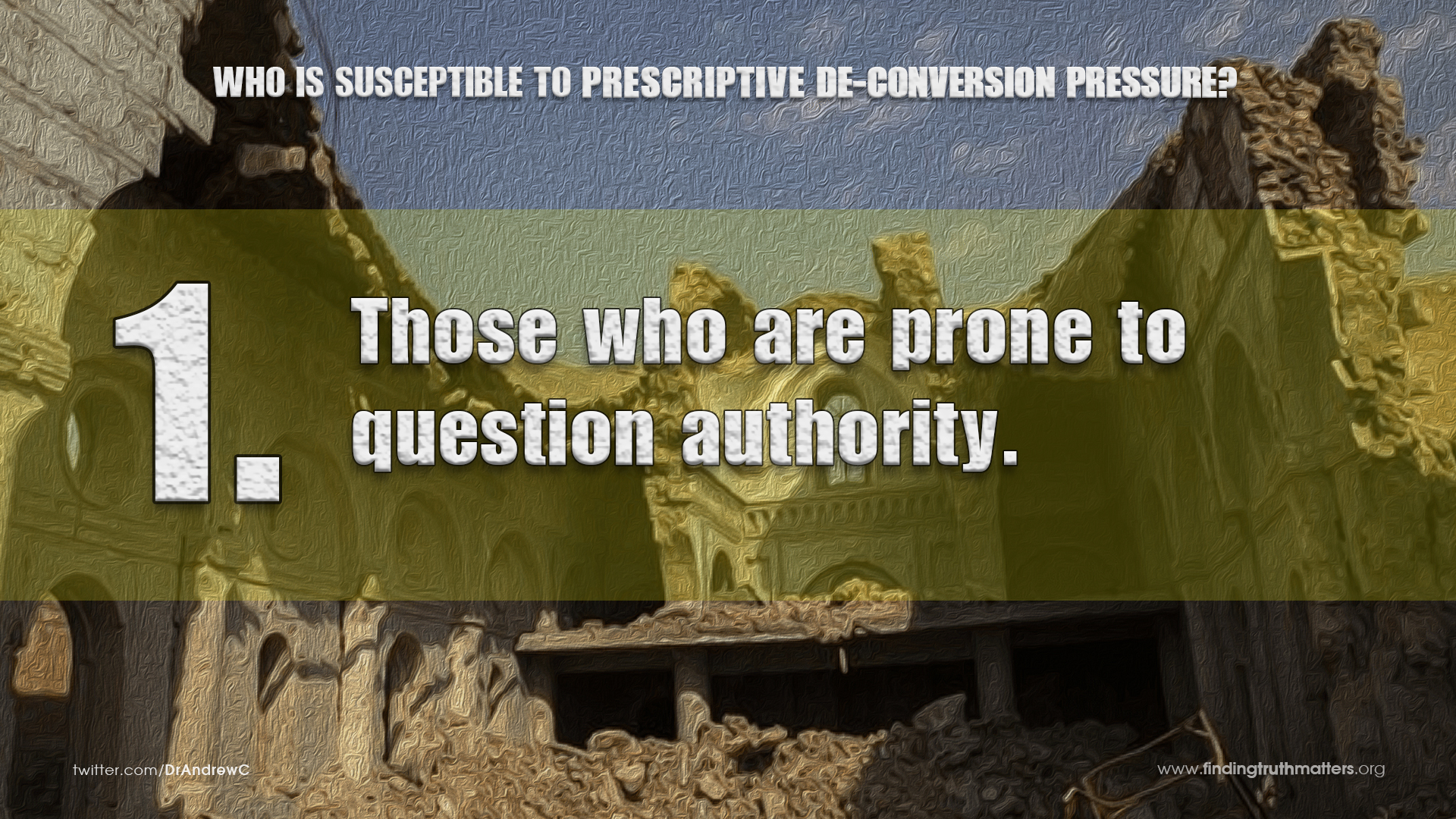
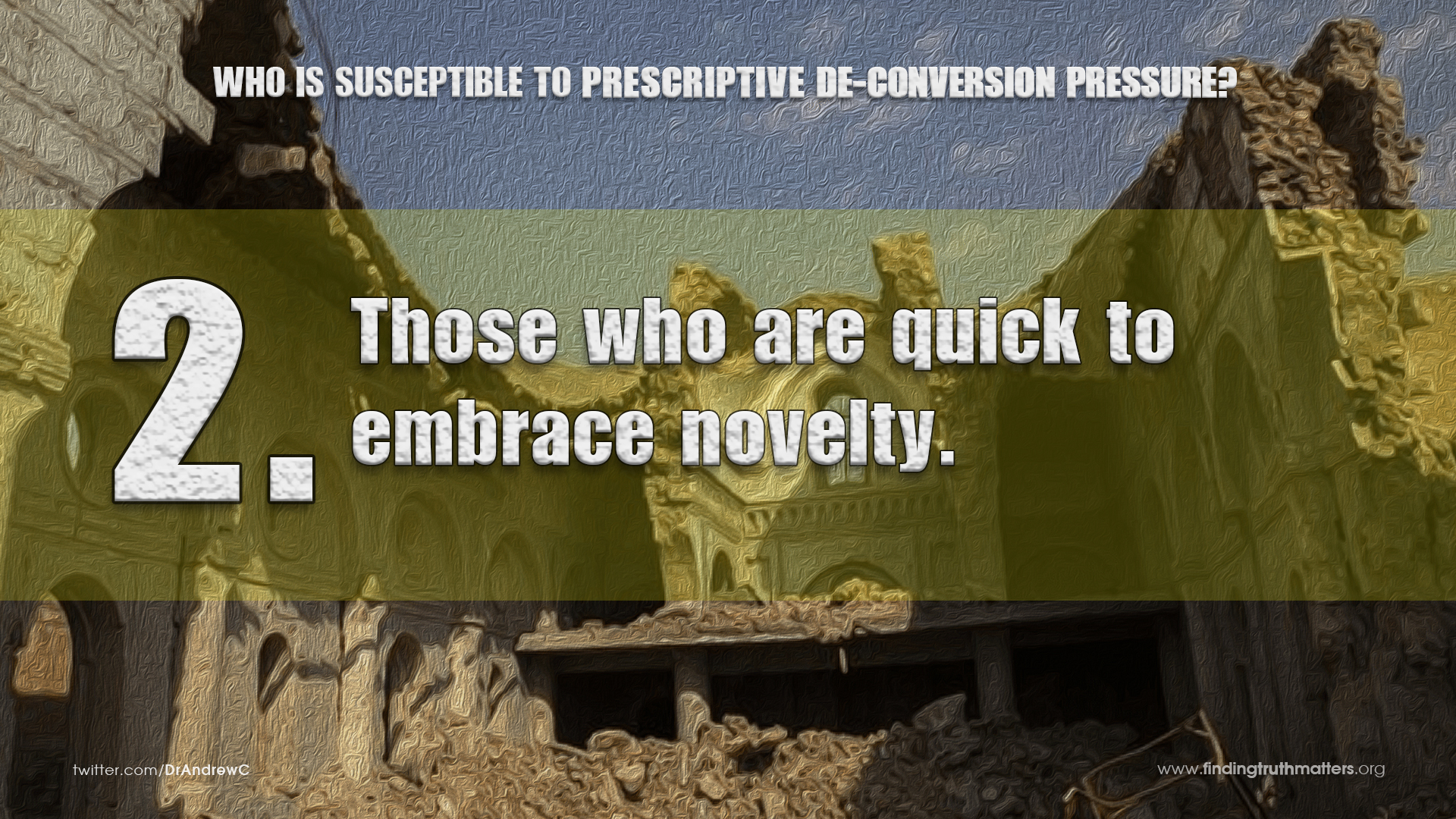
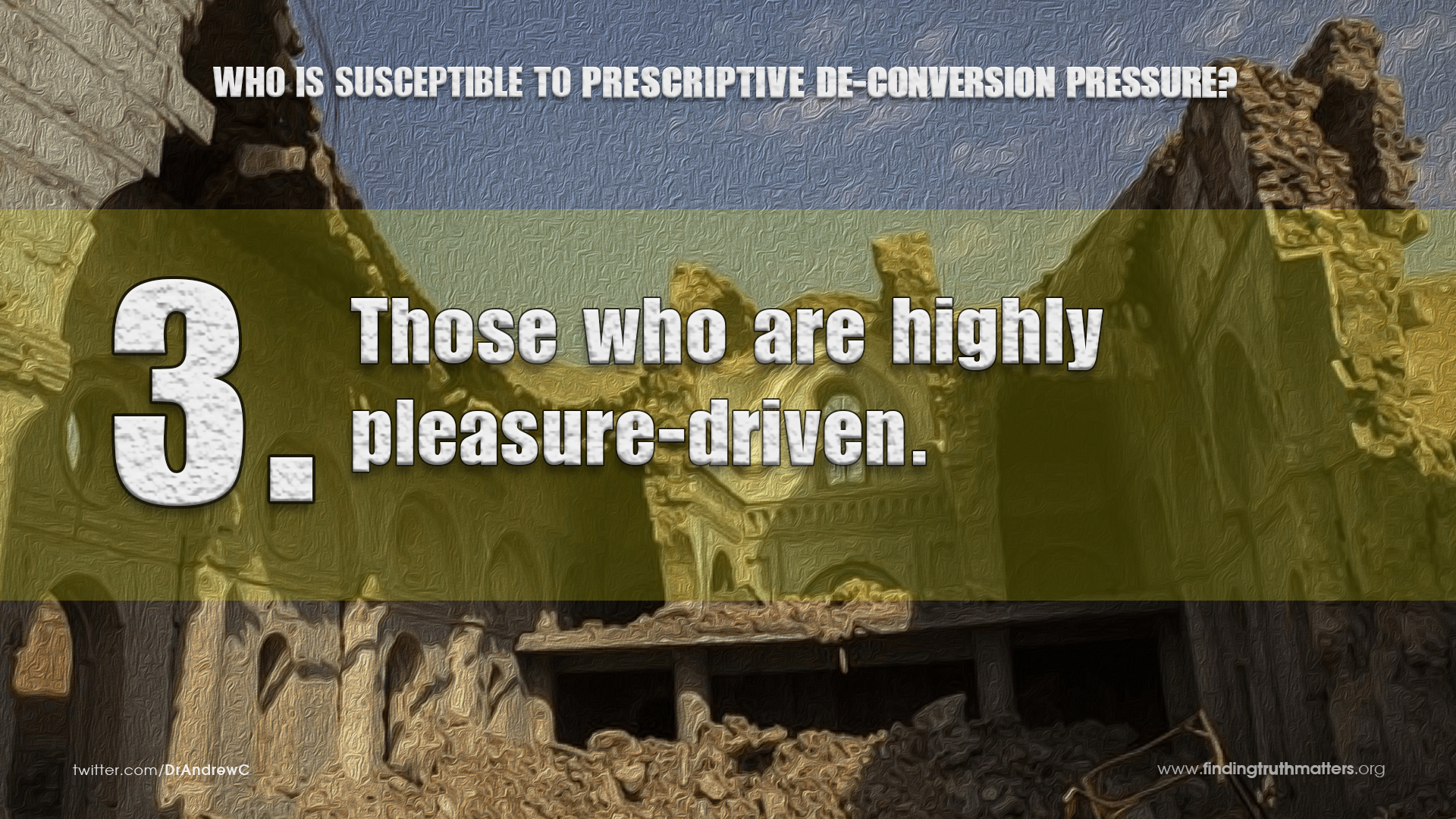
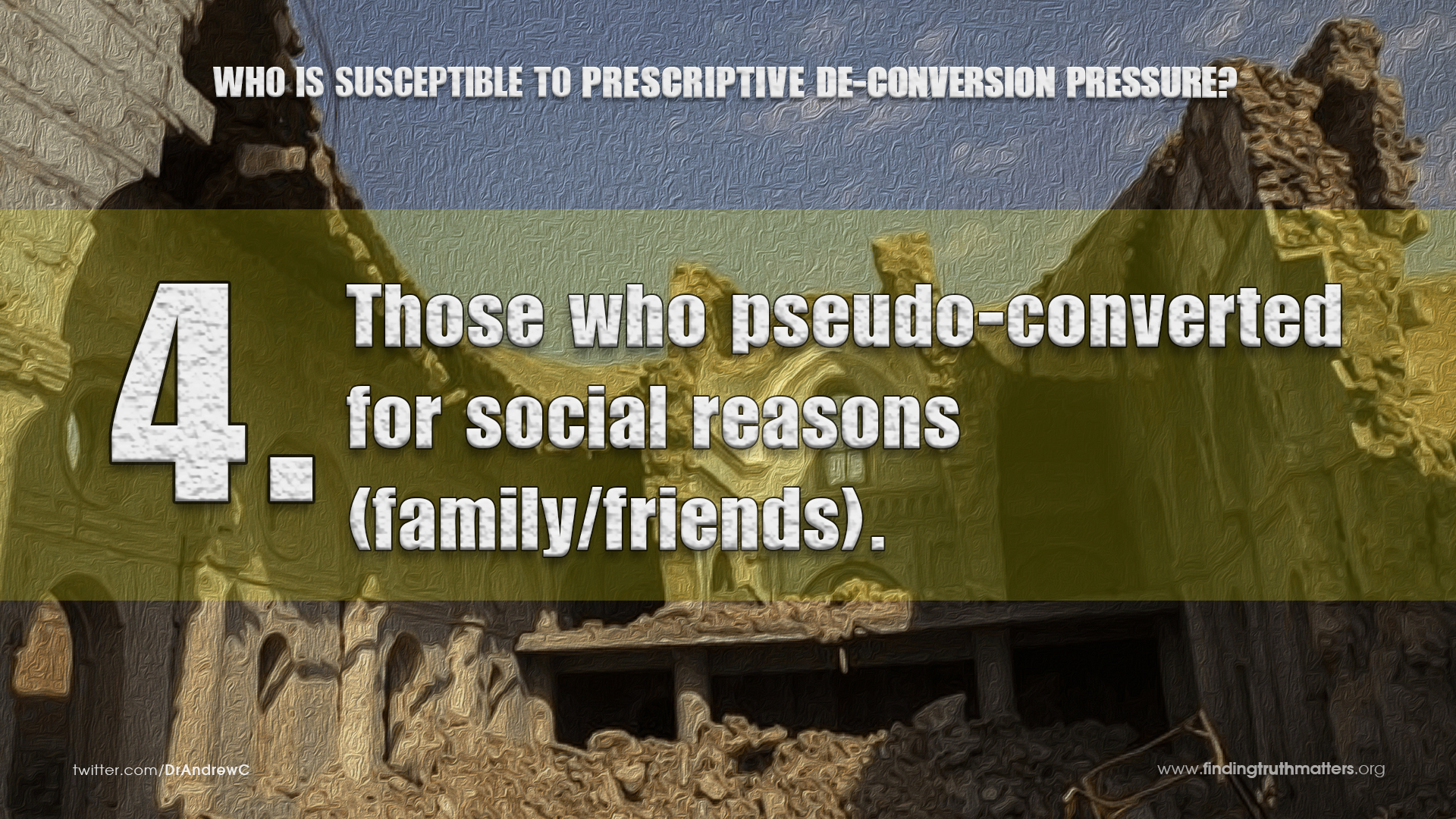

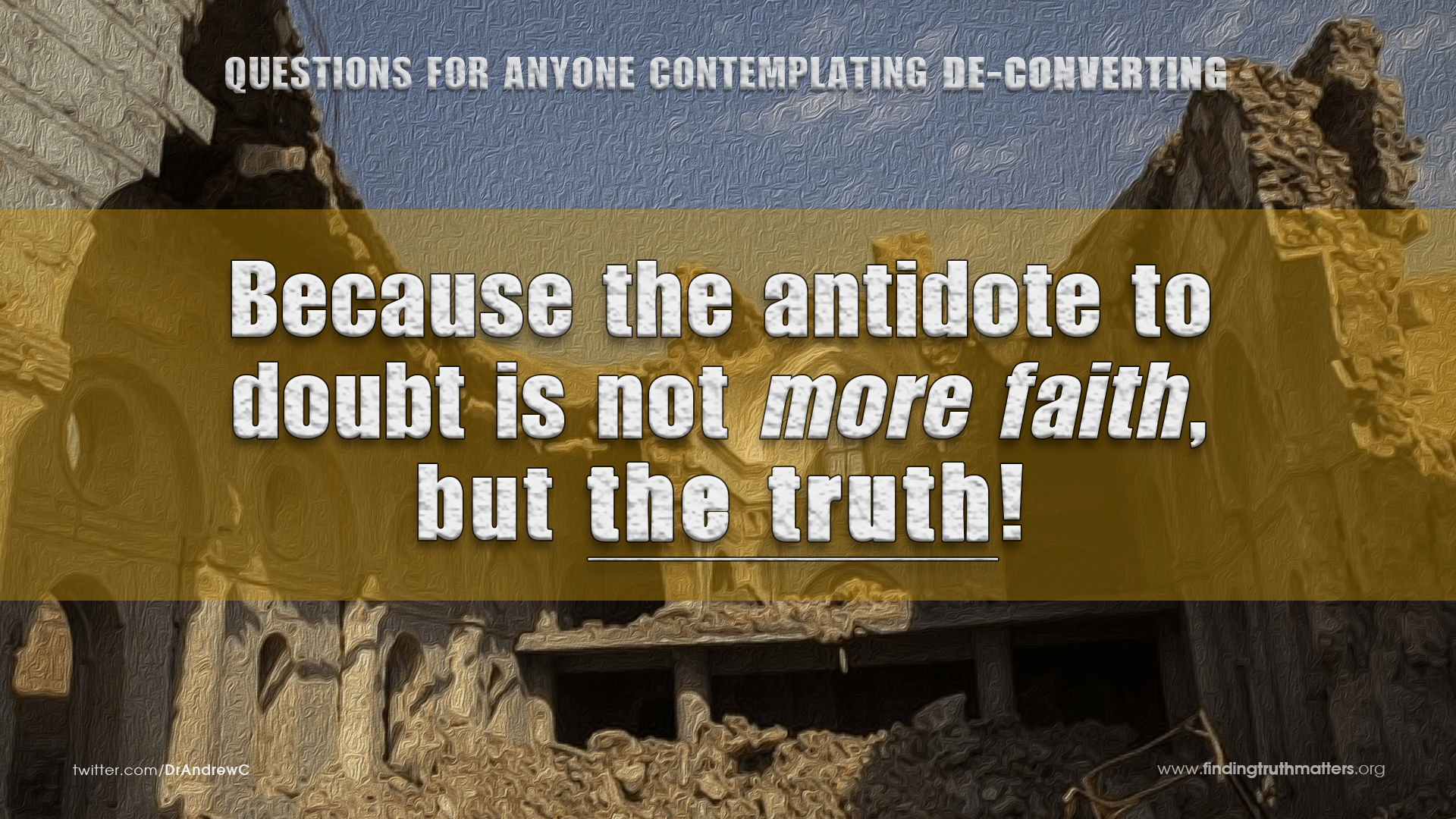
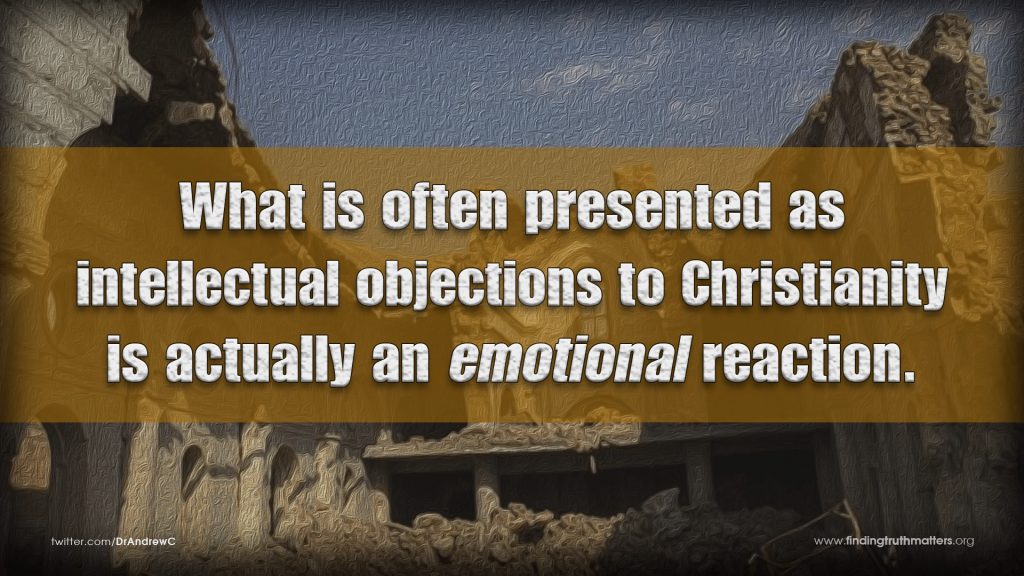
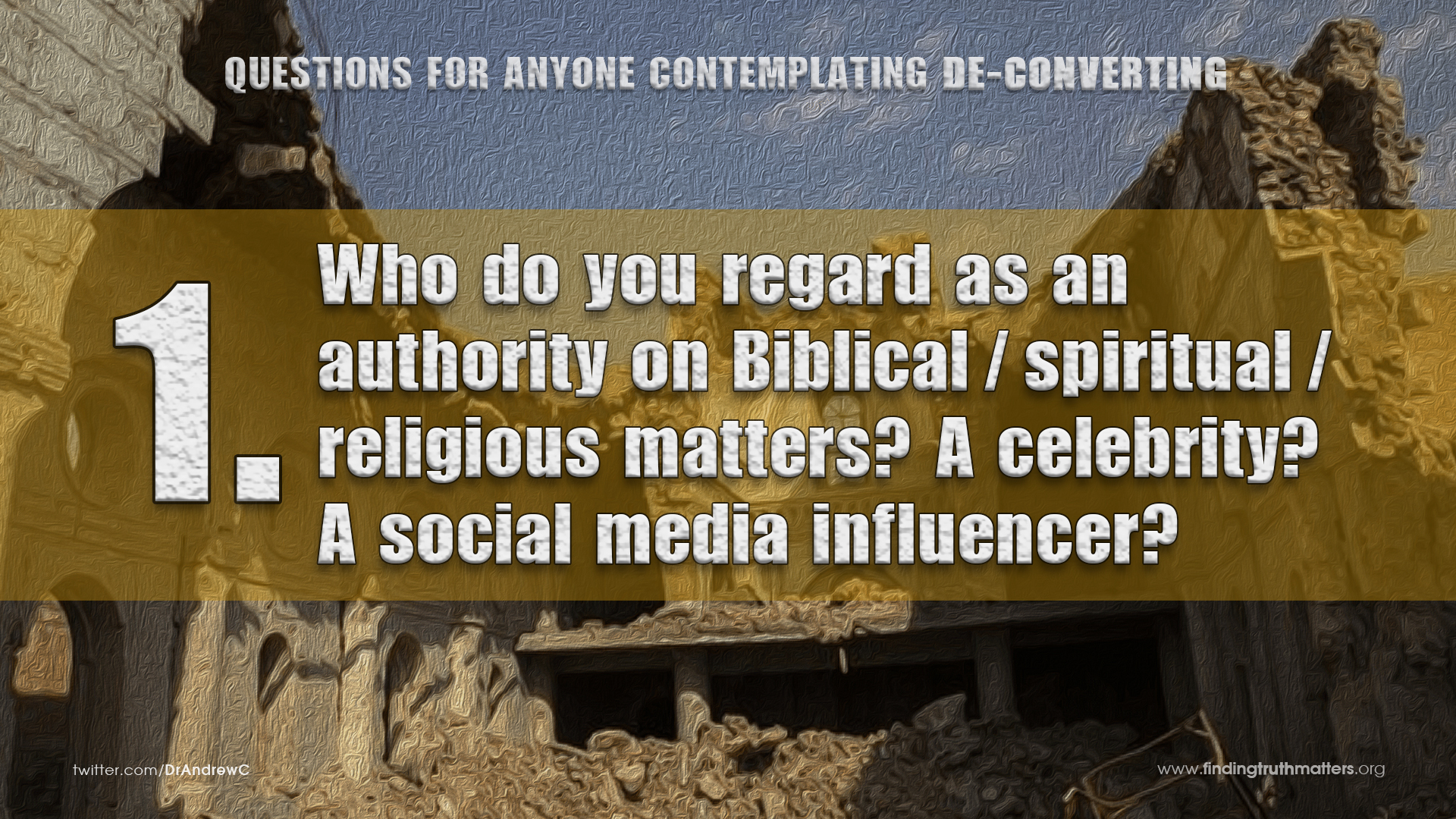
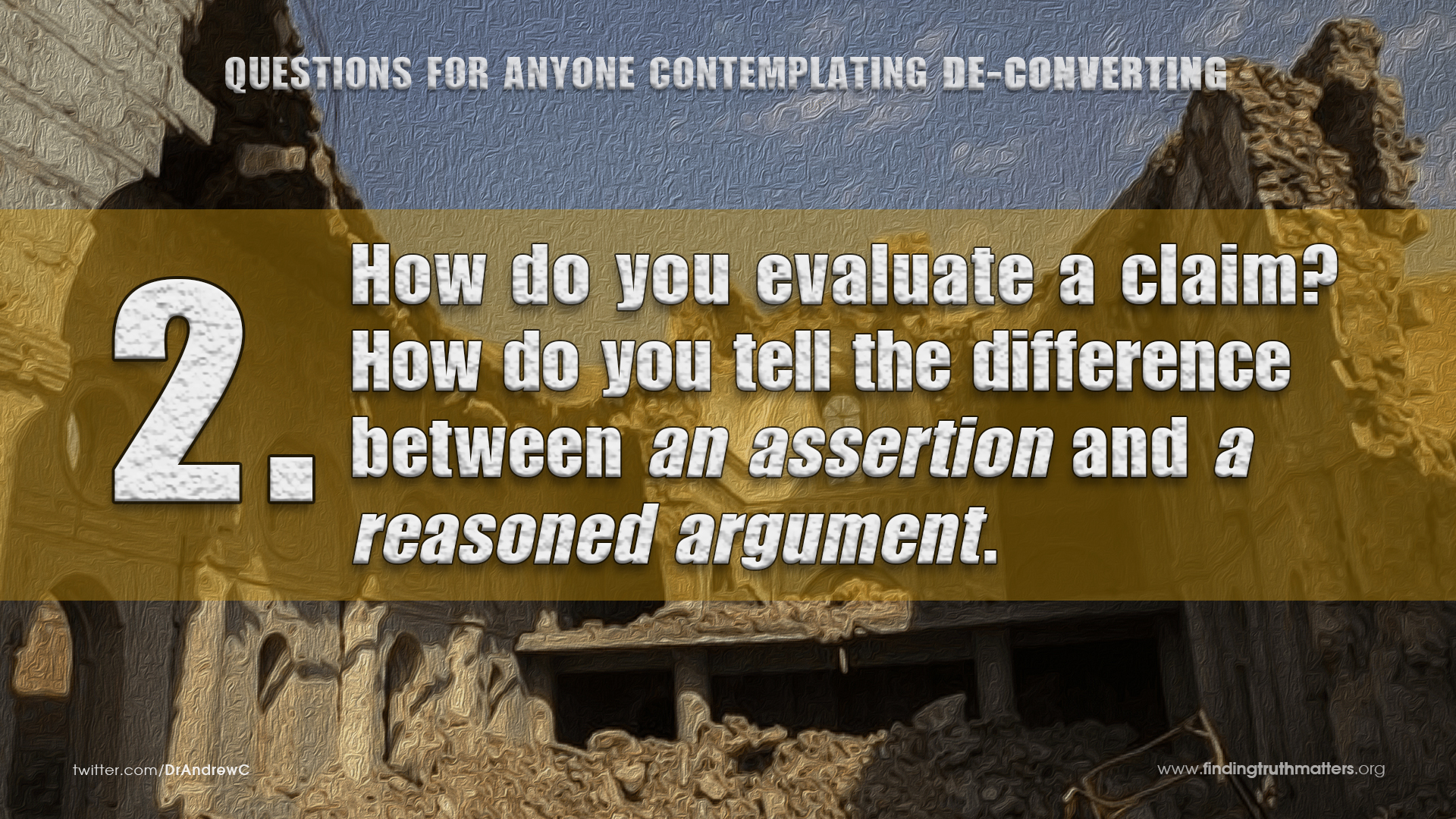
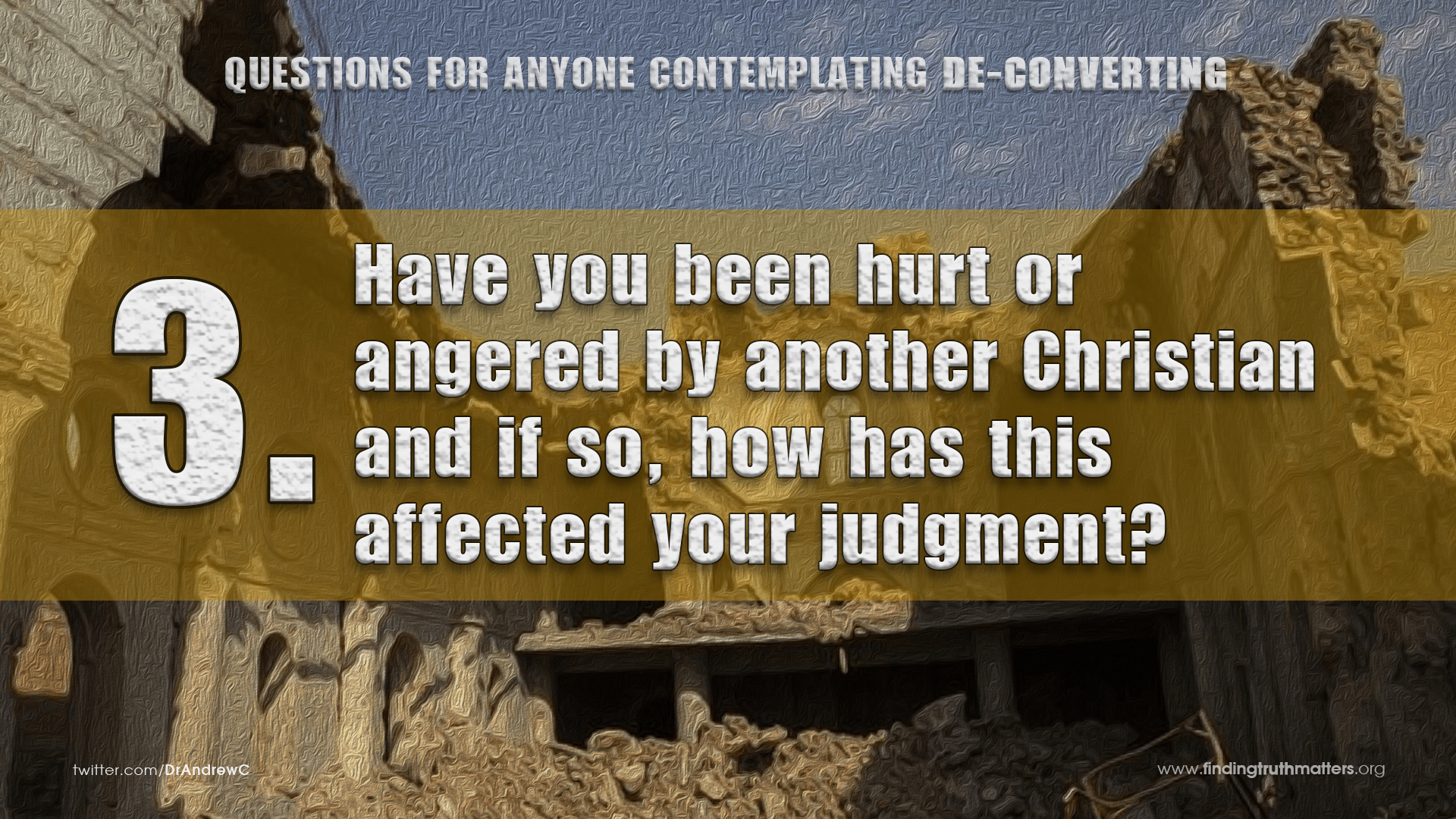
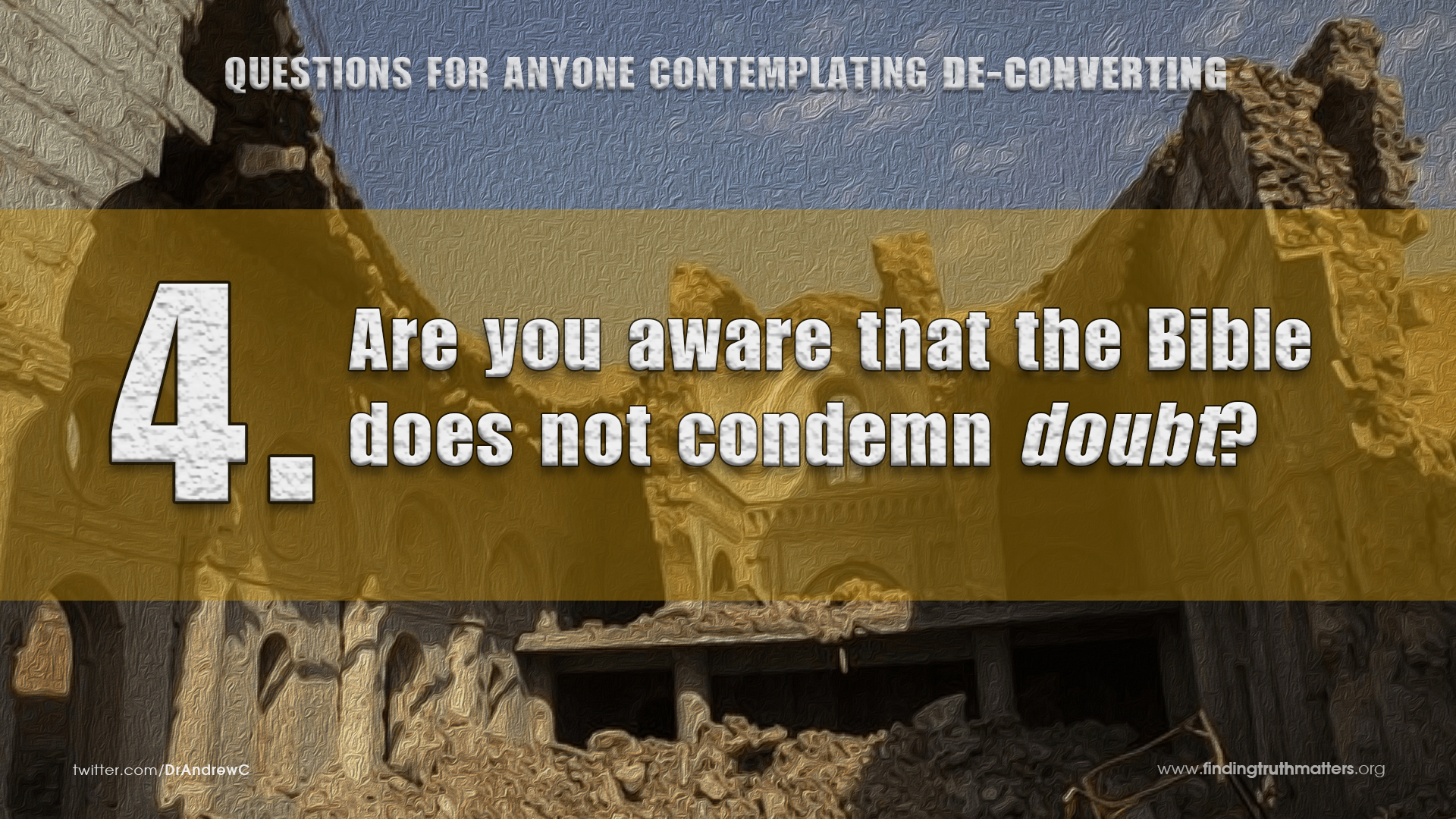
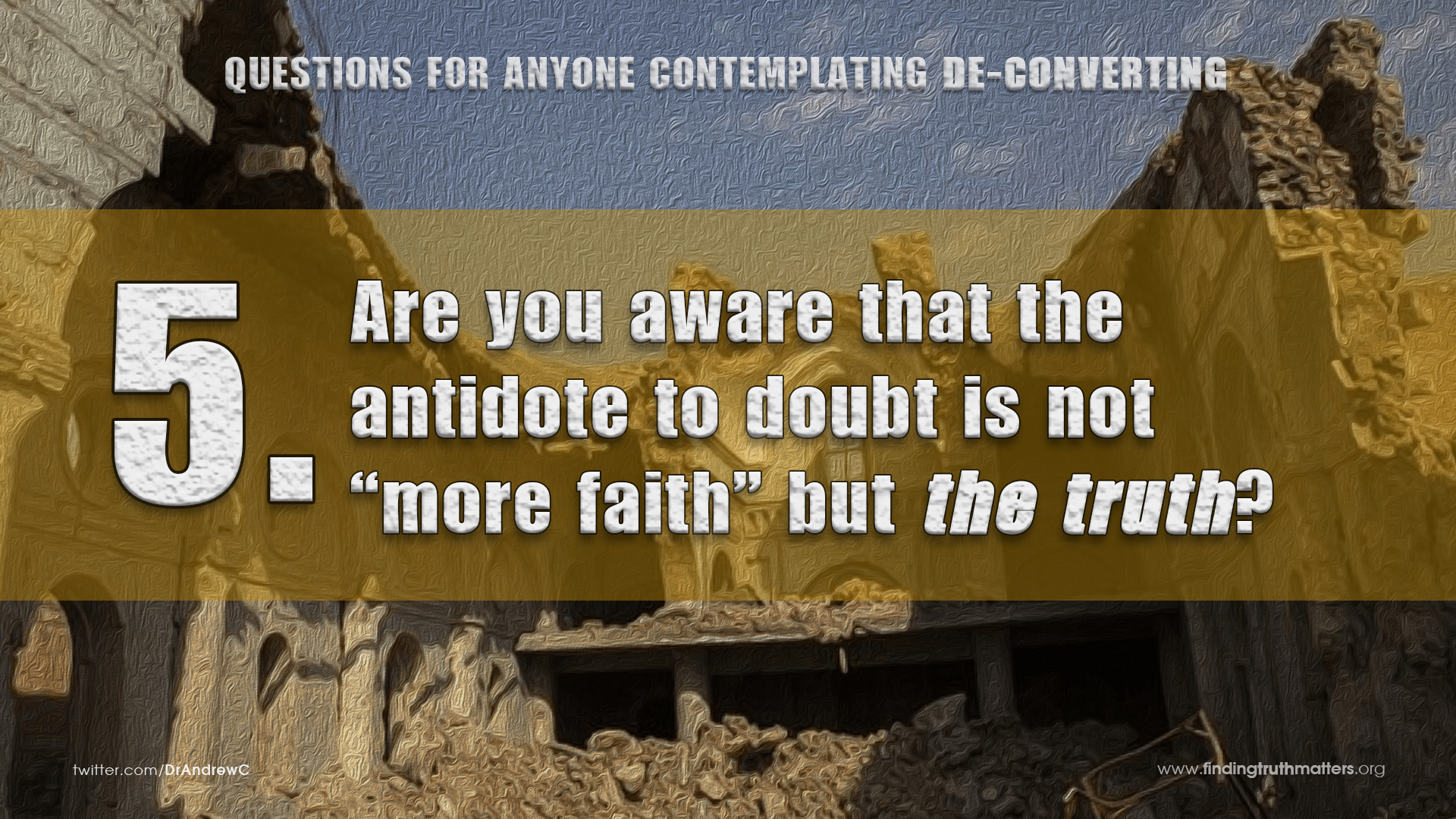










































‘De-construction’ seems to be the deployment of a fancy term (which originated in the complex philosophical work of Derrida, and others and bears little relation to its common usage), for a banal activity: rejection. It appears to provide a shroud of unwarranted significance to plain ordinary tergiversation.
Thanks for this excellent article, which we’ll be using with our church
Thank you for your article. My only question would be about your comments on the unreliability of the genealogies. I have never read a reasonable explanation for the opinion that they cannot be taken literally.
Hi Joe, I am not suggesting that the biblical genealogies should not be taken ‘literally’. What I think that we need to recognise is that the genealogies were written for a purpose which often involved making a point or telling a ‘big’ story. An example of this is seen in Matthew 1 which deals with the genealogy of Jesus which Matthew divides into three groups of 14 generations (which involves skipping over multiple generations in each group). He does this for a very good reason recognised by most Jews in his day — the use of 14 was the number of King David, and saying something 3 times made it absolute. Thus, in this instance he was telling Jews that Jesus was the Messiah, the promised Son of David).
Your appeal to the authority of unknowable and unobserved “science” tells me this is not about appreciating biblical context, but rather trying to ‘synthesize’ popular modern beliefs with the Bible. We should have an understanding that the events Noah described are literally true if we are to take God’s Word seriously. This event strips the authority of all appeals to ‘science’ and ‘millions’ and ‘billions’ of years.
Thank you for your comments Mark. I regard all truth as God’s truth and therefore regard verifiable science as concordant with the Scriptures.